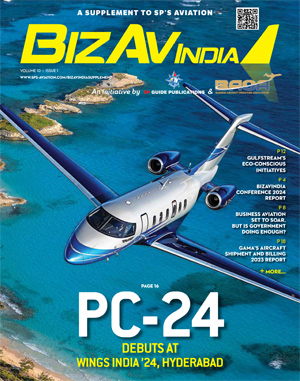NBAA Condemns Disregard for Business Aviation’s Sustainability Leadership
NBAA Exposes Misleading Study Dismissing BA’s Sustainability Leadership while Defending Business Aviation’s Environmental Commitment and Economic Importance

The National Business Aviation Association (NBAA) has forcefully challenged a DC-based think tank’s study for promoting a misleading caricature of business aviation that ignores the sector’s sustainability leadership and the industry’s essential role in the nation’s economy and transportation system.
The report, released by the partisan, Washington, DC-based Institute for Policy Studies, omits key information about the gamechanging innovations that continually lower the carbon footprint for business aviation, and overlooks independent survey data that provides a true representation of the industry as one comprised mostly of small and mid-size companies, flying largely to communities lacking airline service, typically with mid-level employees aboard.
The association said that included among the countless companies fitting this description are those like the Pullman, WA-based company that uses a business airplane to monitor key installations providing power to the region’s electric grid; the Minnesota-based frozen-food company that flies a turboprop aircraft to reach distribution centers in small towns across the US and the Phoenix, AZ-based medical company whose airplanes transport doctors to patients in isolated rural areas.
“Further, the report pointedly minimises the industry’s legacy of achievements in sustainable flight,” including lightweight composites, winglets and satellite-based avionics, as well as business aviation’s growing use of sustainable aviation fuels shown to reduce aviation carbon emissions by as much as 80 per cent – all of which are key to the industry’s goal of achieving net-zero emissions from business aircraft by 2050, NBAA said.
As a final deceptive claim, the study suggests dramatic hikes in costs for those relying on business aviation to operate in the nation’s air transportation system, looking past the reality – as noted by no less an authority than the International Civil Aviation Organisation (ICAO) – that the system’s costs are largely driven by the operations of commercial airlines, given the scale and complexity of the carriers’ hub-and-spoke operations. The Federal Aviation Administration (FAA) has long used the same economist-accepted cost-allocation methodology to reach the same conclusion.
“Unsurprisingly, the report provides none of this information, instead falling back on the tired practice of disparaging an entire industry to sound a predictable call for a raft of punitive taxes, fees and regulations disguised as ‘proposals,’” the Association noted. “Rather than being distracted by the overheated rhetoric the report offers in support of this agenda, NBAA urges an honest discussion of business aviation’s societal benefits and environmental leadership.”





